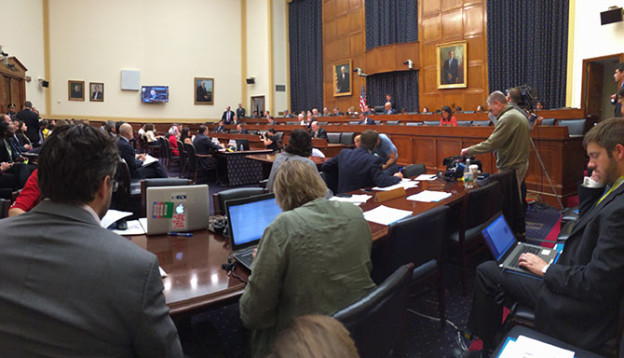WASHINGTON — Rayburn House Office Building Room 2172 was filled with reporters, congressmen and human rights activists on Tuesday morning.
But the presences that dominated the room were those of four American citizens stranded thousands of miles away, held prisoner by the Islamic Republic of Iran.
The House Foreign Affairs Committee convened the morning hearing to gather stories from family members of the four Americans currently imprisoned in Iran: former Washington Post Tehran Bureau Chief Jason Rezaian, former U.S. Marine Sergeant (E-5) Amir Hekmati (who served from 2001-2005), Christian Rev. Saeed Abedini and U.S. government contractor Robert Levinson.
The hearing was held ahead before the committee voted to approve H. Res. 233, a bill that condemns Iran’s refusal to release these detainees and demands transparency about “any other United States Citizens that have disappeared within its borders.”
The prisoners’ relatives testified that the window for their release may close once U.S.-Iran nuclear talks end and Iran no longer needs them as leverage.
“I think if the [nuclear] talks fail and there is no deal, that we could lose the engagement and the constructive talks that we’re having right now,” Daniel Levinson, son of Robert Levinson, said. “Those could cease, and then we’re back to square one.”
Even if the U.S. succeeds in striking a deal, he said, any “sense of urgency” to bring back his father and the other witnesses’ loved ones could disintegrate as soon as it is inked.
The timeline hasn’t caused the detainees’ families to lose hope.
Levinson said his family is encouraged by the Rouhani administration’s attempts at engaging with the United States — albeit not concerning his father’s status.
“We believe that, if the Iranian government had the will and motivation to locate my father and send him home, they most certainly could,” his prepared testimony reads, calling Iran’s engagement with the U.S. “ by far our best opportunity to bring my father home safely.”
Despite the fact that his case was historic in its severity — including a now-annulled death sentence — Amir Hekmati’s sister, Sarah, draws inspiration from the unprecedented communication occurring between the U.S. and Iran today.
“It is … the first time in decades that the United States and Iran are having conversations with each other instead of conversations with third parties,” she wrote in her prepared testimony. “Now is the time that this issue could and should be resolved.”
Naghmeh Abedini, whose husband was imprisoned for participating in a Bible study and whose release is allegedly contingent on his conversion to Islam, said she and her family are relying on their Christian faith to get them through.
“I know that God is with us in this journey, but I also know that God can use men and women to bring about freedom and justice,” her prepared testimony reads.
Jason Rezaian’s brother, Ali, said he appreciated the help from Washington Post staff and the Obama administration on his brother’s behalf, but still expressed concerns about his brother’s health and the conditions of his imprisonment. He noted that their mother was absent from the hearing because she is in Tehran trying to monitor Jason’s espionage trial, which began last week.
“Let me be very clear: The charges against Jason are false,” he said. “With the help of this committee, and others from around the world, I believe Uncle Jason and [Rezaian’s 7-year-old son] Paxton can still see an A’s game in Oakland together this summer.”


